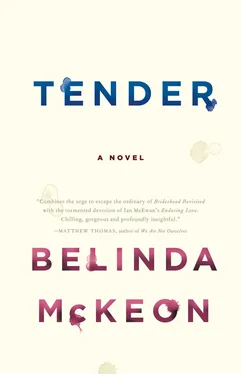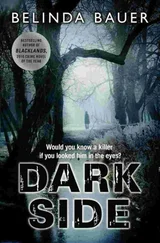Under her blazer, the short sleeves of her silk blouse were soaked through with sweat; she widened her elbows a little more on the table in an attempt to distract herself from the discomfort, and prayed that Foster, beside her, was too caught up in his evident bemusement by Franks to notice any odor there happened to be. She looked down at her notes— Maintaining Independence, Making Decisions, Dangers of Celebrification, Pissing People Off, one of her checklists read, and she underlined the last and began to mentally prepare a follow-up question for Smith, bouncing off of Franks’s remarks, when her gaze, floating languidly over the audience as she chewed over the words enemy and adversary , seemed, all at once, in the same moment, to clamp down and yet swerve maniacally. The room was not spinning, but slamming off of itself, like a rubber ball off a set of narrow walls, and she blinked as his face came into focus and then into yet another focus that was so sharp, so visceral, that the first instant of focus seemed only some kind of dreamlike meandering — and he was not looking at her, but now he was, and the eyebrow lift and half-smile he gave her before turning his attention back to Franks was as shocking to her, as much of a jolt to her whole being, as though he had stood up and somehow sung out her name.
Beside her, Foster cleared his throat, and Catherine realized that she had let hang onstage a moment of awkward, unshepherded silence, and into the microphone she let slip an awkward, unshepherded sound: the exhalation of someone who has just been obliged to run up several flights of stairs. Foster looked at her with an inquiring smile, and she turned to him with the follow-up question that was specific only to the coverage of the Times, and he took it like the fuck-up it was, and he babysat it for a while and then he handed it, smoothed out and newly layered, on to Smith, and by the time it came back to Catherine, ready to become the segue that would bring the whole discussion to a close, she had determined two things: firstly, that the audience was not a thing that needed to be looked at again, not even glanced at, not even during the long questions-from-the-audience part of the event which she would now have to moderate, and secondly, that her new Isabel Marant blouse was now ruined beyond repair.
* * *
The cheerfulness with which she would bestow her greeting would be immense. The warmth would be like a late-evening sun. The affection would be clearly of old, and deep-seated, and barely needing words, even, to settle its amber glow on the heavy air between them, and her smile would be so easy, so natural, and yet so full of knowledge, so full of understanding, of the things that had never been spoken, of the years that had marched through them, and over them, uninterested in the nature of their participation, uninterested in the way it had fallen apart like wet paper, their bond—
(Not wet paper. A tear. A craft knife, its triangular blade down a strip of cardboard, cleaving it so neatly, with such apparent symmetry, the trace of the wound visible even on the surface beneath the space where the parts had joined—)
So many times she had visualized it, dreamed it: their meeting again. At such moments, in such places that she was often ashamed, felt almost diseased with guilt at her own thoughts; even walking up the aisle to Lucien, she had imagined it: his smiling, well-wishing face in the crowd. Only a flash, only the fraction of a moment, but still, it had been there. Yet such moments were uncontrolled; when she daydreamed, when she steered and directed her reveries, they were like this: she saw James first, in enough time to get a hold of herself, get a hold of her face and the expression in her eyes, before he saw her. Thus composed, thus arranged, she would be waiting, and in the street — it was always Dublin, it was always Wicklow Street, for some reason, within view of watching, fascinated people in the window of Cornucopia or one of the other restaurants — when he turned, or when his face, lost in thought, registered the trace of her, the whisper of her, the first, freighted sighting, around them the traffic of cars and shoppers would seem to hush and to become a gentle blur, and they two, two friends, two lost ones, two people who had once again found one another, would stare—
“Hi!” Catherine said instead now, almost squawked it, like a person hanging helplessly out of an upstairs window, having to attract help from below. “Hi, hi!”
“Hi, hi,” James said, a deliberate — probably, yes, mocking — echo, as he leaned in, with that same half-smile, and kissed her lightly, quickly, on each cheek. She lifted her arms, jerked her body forward, for a hug, but he was already straightening up again, so she pulled herself back, and staggered a little, her lips moving too much, too madly, a stiffness already at the base of her skull as she gazed up at him. Had he always been so tall? Well, yes. You did not grow in your twenties. Not physically; not upwards.
(Had his eyes always been that startling shade of blue?)
“So, I saw you were moderating a panel,” he said, in an older, rounded-off version of the voice her memory so often thrust at her, “and I thought—”
“I thought you were in bloody Venice!” Catherine interrupted him, having remembered, as soon as he opened his mouth, the bantering, art world line with which she had decided, soon after spotting him from the stage, to begin any conversation which might ensue; having used it now, though, it sounded unduly aggressive, not to mention stalker-ish; yes, someone in her profession would naturally know that James was about to represent Ireland at the Venice Biennale, but they would not necessarily know, from James’s Twitter stream, that he was to spend this weekend there taking the measurements of the appointed space. “Didn’t I hear something,” she said now, scrabbling for ground, “about you being there?”
James nodded. “Well,” he said slowly, his gaze sliding to the side. “I was there, actually, until around eight o’clock yesterday evening.”
“And now you’re here? ”
“Now I’m here. And so are you.”
“Well.”
“Well indeed,” he said, indicating the auditorium exit. “Do you have a bit of time?”
Probably, it was the fancy artificial light in here, futuristically white and almost breathlessly clear, that made his eyes seem that unfamiliar blue, Catherine thought, as they walked towards the front of the tent, making jumpy small talk about the panel, James’s strides long and hurried in his red jeans and scuffed leather work boots, a pair of green braces looped over his blue oxford shirt. The braces, or rather the look which involved brightly colored braces, she had seen before, in a studio visit streamed on the Greene website and from recent photos on Scene & Herd; it was even more surreal to her in reality, but that was just how things worked; years passed, and the surreal, more and more, was simply the real. James had a beard now, and his red hair was fairer, but also with strands of gray at the temples and in the beard, and his skin, like hers, was now just skin, its textures on show, its pores like dirt flecks, its creases and their tributaries beginning. Probably, if someone’s eyes had been that shade of blue always, that would be the thing, or at least one of the things, you would remember about them most strongly; that would be one of the things you carried with you, wouldn’t it?
That would be one of the things you had, for instance, noticed. What with living your every breath for that person. What with being in love with them.
(The real became the surreal, and the surreal turned its impossible face towards you, and was the real.)
(Emmet’s eyes: they had been blue.)
Читать дальше












